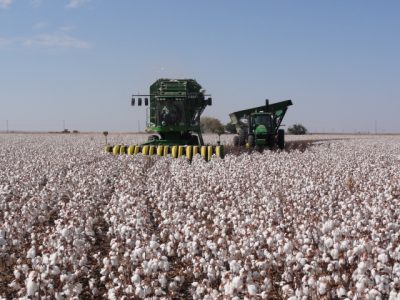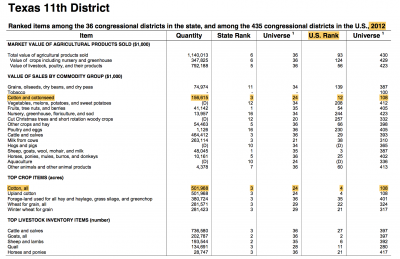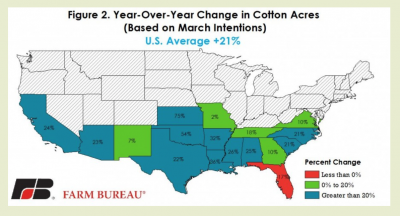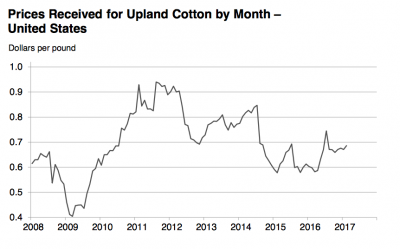The House Agriculture Committee unveiled a draft farm bill Friday that would revamp a key international food aid program, boost risk management options for specialty crop growers and nullify California's…
Farm Bill: Cotton Issues a Significant Concern
The House Ag Committee’s Subcommittee on General Farm Commodities and Risk Management held its second policy related Farm Bill hearing on Tuesday, as lawmakers continue their examination of agricultural programs in advance of the next Farm Bill. Following a farm policy related hearing last week that focused mostly on perspectives from corn, soybean and wheat growers, lawmakers on Tuesday heard perspectives from representatives of the cotton, rice, peanut, sunflower and sugar industries. Today’s update focuses on the cotton issues that were discussed on Tuesday.

Background- December 2015
In December 2015, a House Ag Committee news release indicated that, “House Agriculture Committee Chairman Mike Conaway (R-TX), Ranking Member Collin C. Peterson (D-MN), General Farm Commodities and Risk Management Subcommittee Chairman Rick Crawford (R-AR), and Subcommittee Ranking Member Tim Walz (D-MN) led a rare coalition of rural and urban Democrats and Republicans from across the country, inside and outside of the cotton belt, in requesting that the Secretary use his authority under the Farm Bill to designate cottonseed an oilseed, allowing farmers who produce cottonseed to access the same risk management tools available under the Farm Bill to other oilseed farmers.”
Chairman Conaway explained that, “Cotton farmers are getting hit the hardest right now and they are doing all they can just to hold on without access to key risk management tools under the Farm Bill.”
Then Secretary of Agriculture Tom Vilsack, denied this request, and explained why in February 2016.
A more detailed overview of the cottonseed oil request and the Secretary’s response is available here, “Backgrounder: Cotton oilseed and the 2014 Farm Bill.”
Additional analysis of this issue was also posted at the farmdoc daily blog in January 2016- “Cottonseed and U.S. Oilseed Farm Program Issues,” by Carl Zulauf, Gary Schnitkey, Jonathan Coppess and Nick Paulson.
Chairman Conaway has subsequently reiterated his observations on the shortcomings of the 2014 Farm Bill with respect to cotton.
In a San Angelo (Tex.) Standard-Times article from September, Chairman Conaway stated that:
The cotton part of the 2014 farm bill hasn’t worked and will require an overhaul when the House Agriculture Committee begins writing a new farm bill for 2018.
The article added that, “‘Cotton will have to be dramatically different because it just didn’t work,’ [Conaway] said. ‘The STAX program without a reference price — it just didn’t work — and cotton is in a world of hurt.’”

Looking Ahead
Subcommittee Chairman Rick Crawford (R., Ark.) indicated on Tuesday that, “While we will hear about what is and is not working, we will also have the opportunity to hear from a crop that was left out of the commodity title in the last farm bill altogether – and that is cotton. We will hear about the effects that this lack of policy has had on the cotton industry and the ripple effect across other crops and rural communities. While Committee leadership at the time warned this could happen, this provides yet another real world example of why we need sensible farm policies in place for all major commodities.”
At Tuesday’s hearing, Georgia farmer Ronnie Lee, the Chairman of the National Cotton Council indicated that, “While cotton acres across the U.S. are expected to recover, the lack of eligibility for the same price and revenue policies as other crops remains a major concern. As you know, these Title I commodity policies in the farm bill are designed to help producers withstand prolonged periods of price declines and depressed market conditions. While the Agriculture Risk Coverage (ARC) and Price Loss Coverage (PLC) policies have generally performed well for producers like myself of other crops, I remain vulnerable to further instability in cotton markets.”

Mr. Lee explained to the Subcommittee that, “Cotton is the only program crop that does not have any long-term price or revenue protection policy in the 2014 Farm Bill.”
And he added that, “Cotton policy in the 2014 Farm Bill was enacted largely in response to a World Trade Organization (WTO) trade challenge brought by Brazil against certain components of U.S. farm policy and select cotton-specific policies.
Support can be provided for cottonseed without running afoul of the agreement with Brazil that settled the WTO case and without violating U.S. commitments under the WTO. We strongly believe we need a cottonseed policy in place to help provide support to our producers as a bridge until the new farm bill is enacted, hopefully before the expiration of the current bill in 2018.”
Mr. Lee also pointed out that, “In closing, for the past three years, U.S. cotton producers have struggled with low cotton prices, high production costs and the resulting financial hardships. While current cotton futures market prices have increased from year-ago levels, many producers continue to face economic challenges. The projected increase in cotton acreage is largely the result of weaker prices of competing crops and improved expectations for water in some regions that were experiencing severe drought conditions. Therefore, it is imperative that the next farm bill bring cotton back into the Title I commodity policy so that cotton is able to access the same full complement of risk management tools as other crops.”

DTN Ag Policy Editor Chris Clayton reported on Tuesday that, “While rice and peanut farmers told members of a House Agriculture Subcommittee on Tuesday on Capitol Hill that the farm bill’s Price Loss Coverage program works for them, the chairman of the National Cotton Council stressed the importance of getting cotton recognized again as a crop for farm program payments.”
Mr. Clayton explained that, “[NCC Chairman Ronnie Lee] told Rep. David Scott, D-Ga., that the National Cotton Council has a plan to work through the appropriation process to convert generic acres to cottonseed base acres or base acres for other commodities. That would get cotton back into the commodity title before the next farm bill is written so cottonseed has a baseline for payments. Generic base was granted to cotton producers as one of the tradeoffs for losing cotton as a commodity in the last farm bill. It allows cotton farmers to sign up those acres among other commodities the farmer is growing that year.
“‘We need to convert generic base back to cottonseed base,’ Lee told the subcommittee.
“Scott assured Lee, ‘We will move to make that happen.'”
The DTN article noted that, “Rep. Jodey Arrington, R-Texas, whose district is the largest cotton-producing area in the country, stressed that cotton producers are facing a real disaster. ‘I want to implore my colleagues to please get cotton back into the farm bill,’ Arrington said [See video clip below].”
West TX & cotton are synonymous - cotton is king - & we’re in a real crisis. As we work on the farm bill, I’m fighting to get cotton back in pic.twitter.com/ifeW8cPHlq
— Rep. Arrington (@RepArrington) April 4, 2017
“The testimony did not examine the costs of bringing cottonseed back into the commodity programs or where money would come from to pay for that added safety net,” the DTN article noted.





